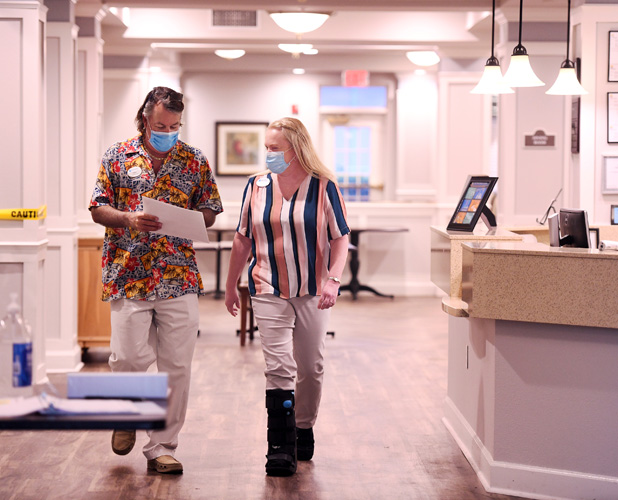In a sea of discouraging news about the spread of COVID-19 among the vulnerable residents of Florida senior care facilities, the company that owns Sonata Vero Beach has taken a proactive approach deserving of praise.
Beginning March 31, the company tested every staff member, resident and private sitter in its system, to get a handle on its exposure to the disease, and the regimen has been repeated several times since.
Coming just two weeks after long-term care facilities went into lockdown, and with not even one suspected case, the bold move was refreshingly transparent.
Overnight, the Sonata system flew into action, testing 1,850 residents and staff in 11 communities in a two-week period, while other nursing homes did much less.
“Although we are hoping for the best, we are prepared for all possible outcomes,” Sonata management said on its website.
As it turned out, that first round of widespread testing turned up no positive results in Vero, though there were five in other Sonata facilities – none of whom had shown any symptoms.
Were it not for testing, those people might have unknowingly infected staff or residents, setting off the domino effect that has proved tragic in many extended-care facilities across the country.
Instead, they were instantly isolated, and all protective measures, from PPEs to disinfecting, were intensified as a result.
“We did this because we believe knowing exactly where we are provides us with critical information and improves our ability to slow the spread of the virus through quarantine and safe separation of our residents,” an online letter reads.
One asymptomatic resident in Vero did eventually turn up positive in repeated testing. A Sonata spokesperson said the resident had spent an extended period outside the facility and was tested after returning. The resident was quarantined, has since recovered, and is no longer living at Sonata.
Four asymptomatic Vero staff members also tested positive in later rounds of surveillance testing. The four have been at home in quarantine for 14 days, but they are getting full pay.
They will undergo testing every seven days until they test negative twice, in tests 24 hours apart. They can then return to work.
Sonata is believed to be the only facility in the county that has done proactive testing of all residents and staff, though others wish they could. Sonata executives had to obtain their own test kits – they used a company in Atlanta. So far, they say they have an adequate supply to continue.
In the case of two other Vero facilities with COVID-19, it was the state health department that conducted testing, including testing those people turned up in contact tracing.
Family of a HarborChase resident who died of COVID-19 said of two private caregivers the family had hired, only the one with COVID-19 symptoms was tested; she was found positive.
According to the family, the Health Department refused to test the caregiver without symptoms, though she had 12-hour-a-day, six-day-a-week contact with the coughing patient.
That requirement of symptoms to test – which Sonata, doing its own testing, was able to bypass any limits and test everybody – varies widely depending on venue.
Palm Garden of Vero Beach, a large nursing home which as of last Friday showed two COVID-19 positive residents on premises as well as two staff members testing positive, would seem a likely pick for widespread testing, given the vulnerability of its population.
Edwin Rojas, the nursing home’s director, would not comment, though he did agree to send the request for information about testing plans to his corporate headquarters. Palm Garden has 15 nursing homes statewide.
HarborChase, which has had seven positive cases including five residents who died, has been expecting testing help from the National Guard.
It has been a month since Gov. Ron DeSantis said National Guard teams were going to canvass the state to do COVID-19 testing of all residents and staff in long-term care facilities with COVID-19 positives.
“We have been working with the Department of Health and the National Guard to provide testing for our associates and residents, and we are on their schedule to have that testing today,” a HarborChase spokesman said Monday.
In an odd twist over the weekend, the state appeared to have the impression nursing homes were resisting testing. Claiming it would smooth the way for the National Guard testing effort, the state’s Agency for Health Care Administration issued an executive order saying that elder care homes must make all residents and staff, including outside staff, available for required testing including if they are asymptomatic.
If the facilities allowed staff to refuse, the homes could face fines or lose their licenses.
Resistance to testing was not a problem at Sonata: “All team members and residents have been tested several times,” said Sonata corporate spokesperson Beth Dutton. “We have not had any team members refuse.”

